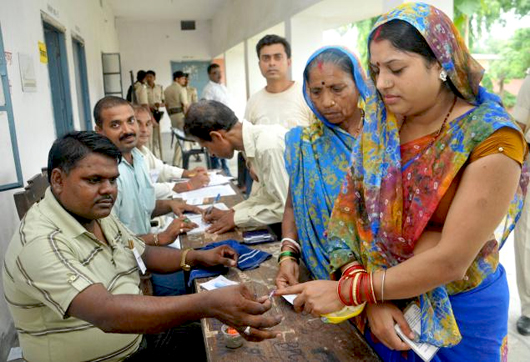Patna, Nov 1: Voting began this morning for 55 Assembly seats in the fourth and penultimate phase of Bihar election amid tight security arrangements.
Polling is being held from 7 AM to 5 PM in 43 constituencies, while it has been shortened by one hour in 8 seats and voting would end at 3 PM in four seats, said R Lakshamanan, Additional Chief Electoral Officer.
Both the warring groupings NDA and grand secular alliance are claiming that the fourth round would provide them a decisive lead over the other.
Arrangements have been made on a total of 14,139 polling booths for 1,46,93,294 electorate to exercise their franchise in this phase in which 776 candidates including 57 women are contesting.
Altogether 1163 companies (each comprising 100 personnel) of Central Paramilitary Force and state police will be posted to ensure free and fair elections. A total of 38 motor boats are engaged for riverine patrolling.
Prominent personalities whose fate would be decided in this phase are senior minister Ramai Ram (Bochaha), Ranju Geeta (Bajpatti) and Manoj Kushwaha (Kudni).
Ramai Ram, popularly called as "Bhisma Pitamah" in his Bochaha constituency, has won the seat nine times since 1972 and this is his 10th bid to enter Assembly.
He is challenged by Anil Sadhu, son-in-law of LJP chief Ramvilas Paswan, who had been seen crying on TV after ticket was denied to him. Later, LJP fielded him from Bochaha.
RJD president Lalu Prasad's native village Phulwaria in Gopalganj district which is part of Hathwa constituency is also voting in this round. Sitting MLA Ram Sewak Singh has been fielded by JD(U) from the seat.
Former minister and Hindustani Awam Morcha leader Mahachandra Prasad Singh is fighting against him on the seat.
BJP had won 26 out of 55 seats spread across seven districts of Muzaffarpur, East Champaran, West Champaran, Sitamarhi, Sheohar, Gopalganj and Siwan in 2010 Assembly polls. Its then ally JD(U) had emerged victorious in 24. RJD had won 2 seats and Independents 3.






Comments
Add new comment